Changing for Climate Series
Some people were so excited about electric vehicles (EV) they ordered them online, sight unseen sometimes waiting up to a year for delivery.
But for most of us, moving to an electric vehicle (EV) is a big decision. That’s how it was for Howaida Hassan and her family. Their journey to going all-electric happened over a number of years.
Howaida and her husband Tim wanted to reduce their impact on the environment so they started by purchasing a tiny, fuel-efficient Smart Car as a second car, along with their small minivan.
Howaida is an engineer, but she’s definitely not your typical car enthusiast. She’s a hockey mom with an interest in clean transportation. She actually helped create Edmonton’s Electric Vehicle Strategy and quickly learned all of the benefits of owning an EV.


Dipping their toes in the EV world
Howaida has three hockey-playing kids and squeezing kids and hockey gear into the Smart Car was challenging at times.
When it came time to replace Smart Car they really wanted to move to an electric vehicle. They scoured the used car ads and eventually landed on a used BMW I3.
“I test-drove it. It was January, it was minus 20. It was cold. We drove it home to show the kids and they instantly fell in love and said, ‘Of course, this is the way to go.’”
They loved the I3, but the range was only about 130 kilometres in summer and shorter in the winter. So, when it came time to replace their small minivan, they had to make the big decision whether to go all-electric.

Going All-Electric
The BMW I3 was fine for use around the city, but if they were going to go all-electric, they needed something with a longer ranges
At the time, the only used cars they could find with longer ranges were Teslas, so they kept scouring the used car ads, and flanded on one in Calgary.
With a factory rating of 370 kilometres range the Tesla is enough for them to drive to Calgary, but for peace of mind, they always stop halfway in Red Deer for a quick charge.
In their experience, winter can reduce that range by as much as half, when it’s really cold. But thanks to the level II chargers in their garage, Howaida prewarms her car before driving in the winter, to get the most out of the vehicle’s range.
No matter how cold it is outside, her EV always starts and heats up fast.

Charge It – Filling up the EV costs a lot less
With soaring fuel costs Howaida says she spends as little as one-fifth on fuel costs to power her EV, compared to gas cars. And with so few moving parts, there are lower maintenance costs (and no oil changes!) associated with EV ownership.
Howaida and her husband installed two level II chargers in their garage, one for each of their EVs and every morning they leave home fully charged.
There are people who get by with the level I charger that comes with the car, but most EV drivers install a level II charger at home for peace of mind, to benefit from inexpensive charging and to ensure their EV is always good to go.
When heading out on a road trip Howaida looks for Level III chargers for faster charging.
Car buyers often say a lack of charging infrastructure is a factor holding them back from purchasing an EV, but in practice, Howaida’s experience has been that it’s access to fast chargers along the highways that is really important.

Survey says people love their EVs
Things are changing fast. Walking into a car dealership in mid-2023 the salesperson said most people are now looking for hybrids or EVs, a big change from just a few years ago.
Automakers are investing $515 billion in an estimated 400+ models of EV in development. German automaker Volkswagen leads the pack with an investment of $112 billion.
A Canadian Automobile Association survey found worries about range and winter driving decline significantly after drivers buy an EV. They also found 97% of EV drivers say they would buy another EV and 89% say they enjoy driving their EVs more.
Whatever your motivation is for choosing electric, it’s important to do your homework and understand your commuting needs, as well as charging availability including in your home.
According to Plug N’ Drive, there are over 70 different types of EVs, including both hybrid and battery electric models. And, right now, the federal government is offering point-of-sale incentives of up to $5,000 on new model EV purchases. Check to see which EVs are eligible here.
(David Dodge of Green Energy Futures worked with the City of Edmonton to produce a 14-part series on people Changing for Climate – we are pleased to present an adapted version of the original story here)

